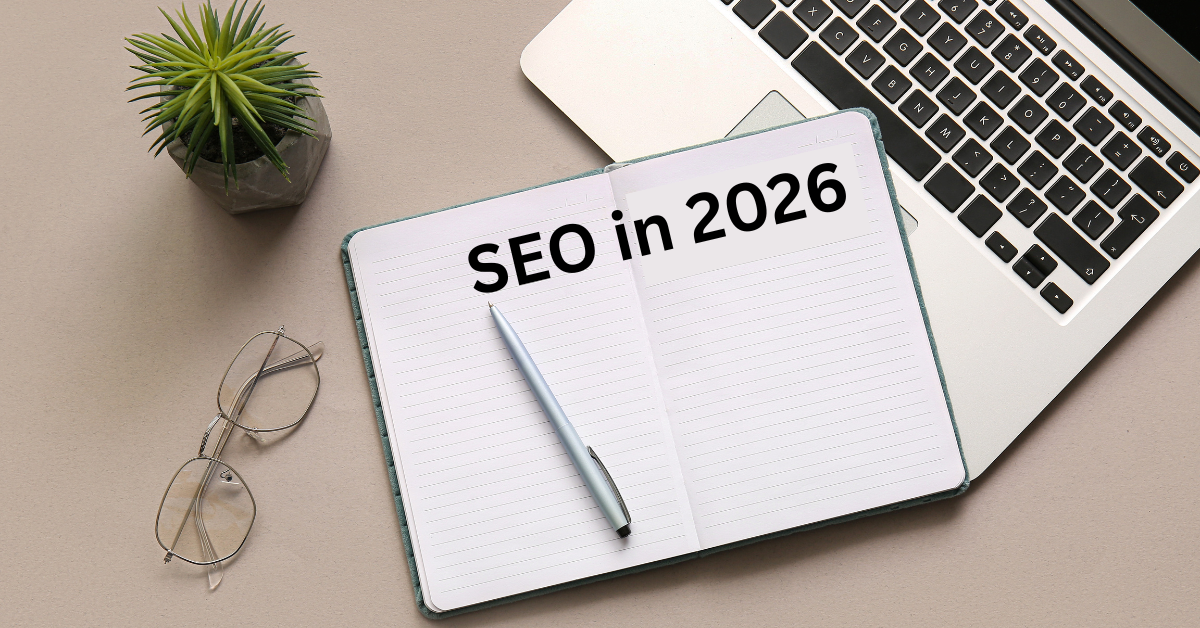SEO has changed a lot. It’s not just about showing up first on Google anymore. Before, people only focused on keywords, backlinks, and how fast a site loaded. Now, it’s much more than that. SEO in 2026 is all about understanding human behavior and matching every search with real intent. In 2026, SEO is about people not just search engines. It’s about giving users what they want before they even finish typing. Modern search tools understand meaning and intent. They use AI and machine learning to figure out what someone really wants and show results that fit better. That means SEO is no longer just about rankings. It’s about helping people find answers quickly and building trust. Good SEO now feels natural and useful. If your site gives people what they need and is pleasant to use, Google will notice. This new SEO world is built on three main things: experience, relevance, and trust.
Let’s look at the six big SEO trends shaping 2026 and beyond.
Technical SEO in 2026 – Building Smarter Foundations
Voice Search Becomes the New Normal
Typing is no longer the only way to search. People now talk to their phones, smart speakers, and even their cars. By 2026, more than half of all online searches are expected to be voice-based. That means websites need to “sound” more human. When people speak, they use full sentences like, “Where can I get pizza near me right now?” instead of typing short phrases like “pizza near me.” Writers should start using natural, everyday language in their content and include simple, question-style phrases.
Adding an FAQ section can help, too, since voice assistants often pull short answers from these parts of your website.
From a technical side, websites should:
- Load fast (under 2 seconds)
- Use structured data to help Google understand content
- Give short, clear answers to common questions
Voice search isn’t only about technology. It’s about understanding how people speak and what they mean. When your content sounds natural and friendly, it builds trust and is easier for search engines to pick up.
Mobile-First Indexing Is the Rule
Most people use their phones more than computers to browse the internet. Because of that, Google now looks at the mobile version of a site first. This is called mobile-first indexing, and by 2026, it’s the normal rule for SEO. If your website doesn’t work well on phones, you’ll lose visitors quickly. A mobile-friendly site should load fast, use simple menus, have large readable text, and avoid pop-ups that block the screen. You can test your site’s mobile performance using free tools like Google Lighthouse or PageSpeed Insights. Mobile design is no longer optional. It’s how people experience the web today. If your site looks messy or loads slowly on a phone, visitors will leave. And when people leave quickly, Google takes that as a bad sign.
Think “thumb-friendly.” Buttons should be easy to tap. Text should be clear. Images should load fast, even on slower internet. When a website feels easy to use, people stay longer and that helps SEO too.
Core Web Vitals and User Experience
Google now cares about how real people feel when using your website. This is where Core Web Vitals come in. These are three main factors Google checks:
- Loading speed (Largest Contentful Paint): how fast your main content loads
- Interactivity (First Input Delay): how quickly users can click or type
- Visual stability (Cumulative Layout Shift): whether your page moves around while loading
If your site is slow or jumpy, people will leave. And when users leave fast, Google sees that as poor experience. To improve, keep your site design simple, use fewer heavy images, and avoid too many pop-ups or auto-playing videos. A good rule to remember is: “If it feels good to use, it’s good for SEO.” When people enjoy browsing your site, they’ll stay longer, click more, and come back again. Even small fixes like resizing images or cleaning up code can make a big difference. In 2026, having a fast and user-friendly site isn’t just nice to have. It’s a must for strong SEO results.
E-A-T Becomes E-E-A-T
You might have heard about E-A-T: Expertise, Authoritativeness, and Trustworthiness. In 2026, Google added another “E” Experience. This means Google wants content written by people who have real experience in the topic, not just general knowledge. For example, a doctor writing about health is more trusted than someone without a medical background. A restaurant owner sharing cooking tips is more trusted than a random blogger. Google now looks for real, lived experience behind the content. To show your experience, add your name, bio, or certifications. Use true stories, reviews, and real customer feedback. Also, link to reliable sources when sharing facts or data. Search engines are smarter now they can tell when content is copied, fake, or written just to please algorithms. In 2026, real and honest content wins. Experience helps your website stand out. If you’ve done something, show it. If you’ve learned something, share it. Google rewards creators who’ve “been there and done that.”
Structured Data and Semantic SEO
Search engines no longer just look at words, they try to understand what those words mean. That’s where structured data, also called schema markup, comes in. When you label parts of your content properly like naming something as a “product name,” “price,” “rating,” or “FAQ” Google can read it more clearly. This helps your website show extra details right in the search results. For example, when someone searches for a product, they might see stars, prices, or reviews below your site link. Those are called rich snippets, and they can grab people’s attention fast. The good thing is, structured data helps both people and search engines. It tells Google what your page is about without needing to repeat the same keyword again and again. This is also part of something called semantic SEO, which means writing naturally in a way that makes sense to humans but also helps search engines understand the topic. So instead of writing “best running shoes” twenty times, you can use similar phrases like “athletic footwear,” “sports sneakers,” or “comfortable joggers.” This makes your content sound real, not robotic, and it gives Google more clues about what your page covers.
Security and Data Privacy
People won’t stay on a site they don’t trust. That’s why security and privacy are more important than ever. By 2026, every website is expected to use HTTPS, secure cookies, and clear privacy settings. This means the connection between your site and the visitor’s device must be safe from hackers or data leaks. Google also pays attention to this. Sites without HTTPS can lose ranking or even show a “Not Secure” warning in the browser. But security isn’t just about Google it’s about people. Visitors want to know how their data is collected, stored, and used. That’s why websites now include easy-to-read privacy policies explaining everything in simple terms. When people feel safe, they trust your brand more. They spend more time on your site, check your products, and are more likely to make a purchase. So, keeping your website secure isn’t just about rules or laws, it’s about showing your visitors that you respect their privacy.

AI, Content, and the Rise of Human-Centered SEO
Search engines are getting smarter every year. They don’t just look at words anymore they understand meaning, tone, and even emotion. By 2026, Artificial Intelligence (AI) and Machine Learning (ML) are changing how content is written, shared, and ranked online. But even with all this new technology, human creativity still matters more than ever.
AI in Keyword Research and Strategy
In the past, finding the right keywords took hours. Marketers used tools like Google Keyword Planner to guess what people might type. Now, AI tools such as ChatGPT, Gemini, and SurferSEO can study search patterns, predict what people will search for next, and suggest keywords based on real intent. For example, instead of just targeting “cheap flights,” AI might suggest “how to find cheap flights for last-minute trips.” These longer phrases may get fewer searches, but they attract people who are ready to act. Zero Search Volume (ZSV) keywords, which are very specific phrases that don’t appear in traditional keyword tools, help brands connect with niche audiences. Using AI to explore forums like Reddit or Quora can uncover hidden questions that turn into valuable content ideas.
Smart Content Creation with AI
AI can now help writers plan, edit, and improve content. It can suggest outlines, check grammar, adjust tone, and even analyze what content performs best. But AI does not replace human writers. It allows humans to focus on creativity, storytelling, and real-life examples while AI handles structure and accuracy. A common workflow is for AI to study competitors and search intent, then a human writer adds emotion and context, and finally AI reviews the piece for clarity and optimization. This teamwork produces content that is both accurate and engaging, combining the power of data with the human touch.
Personalization and Predictive Search
Search engines now act like personal assistants, predicting what people want before they ask. This is called predictive search. They study a user’s past searches, location, and browsing behavior to show results tailored to that person. That means SEO must focus on personal experience rather than just general rankings. For example, a fitness website might show “morning workouts for beginners” to one visitor and “HIIT sessions for weight loss” to another. Marketers create multiple versions of content to match different user journeys. SEO in 2026 is about delivering the right message, at the right time, to the right person.
Visual and Interactive Content Optimization
Plain text is no longer enough to keep users’ attention. People expect visual and interactive content like videos, infographics, slideshows, and quizzes. Search engines now index these forms of media like regular pages, and AI can even recognize what is inside images and videos. Adding descriptive alt text, captions, and schema markup helps both users and search engines understand content. Interactive features such as polls or sliders keep visitors engaged longer. When users spend more time interacting with a page, Google sees the content as useful, which improves ranking and engagement.
AI-Powered On-Page Optimization
AI tools now monitor websites in real time, detecting issues and suggesting improvements. They can recommend rewriting meta descriptions, adjusting titles, updating internal links, or improving pages that are losing traffic. AI can also spot content that is outdated and suggest updates to keep it relevant. This makes SEO an ongoing process rather than a one-time task. By continuously analyzing user behavior, AI helps ensure websites remain fast, engaging, and effective at meeting searchers’ needs.
Ethics and Balance in AI SEO
Even though AI is powerful, it must be used carefully. Over-relying on automation can make content sound robotic and repetitive. Search engines can detect content that lacks originality or human emotion, and it may not rank well. Human insight is still essential. Writers should check facts, add personal experience, and write with creativity. Being transparent about AI’s role and avoiding plagiarism are also important. The best content combines AI efficiency with real human perspective, delivering both value and authenticity to readers.

Off-Page SEO, User Experience, and the Power of Trust
SEO in 2026 is not just about what you write on your website. It’s also about what happens outside your website, how people see you, talk about you, and trust you online. That’s called Off-Page SEO, and it plays a big part in how search engines decide if your site deserves to be on top. At the same time, User Experience (UX) how people feel when they visit your site is just as important. If visitors enjoy using your site, they stay longer. That tells Google your site is helpful and worth showing to more people.
1. Building Strong Foundations: Quality Over Quantity in Backlinks
Think of backlinks like recommendations. When another website links to yours, it’s like they’re saying, “Hey, this site is good!” But in 2026, Google doesn’t care about how many recommendations you get it cares about who recommends you. A few links from trusted, well-known websites are far better than hundreds of random ones. So instead of trying to get links everywhere, focus on places that make sense for your business. For example, a food blog linking to a bakery website is more helpful than a sports site doing the same. Good backlinks come from honest sharing, not from tricks or shortcuts.
You can earn strong backlinks by:
- Writing useful guides or local stories people want to share
- Partnering with other honest businesses
- Creating simple tools, images, or posts that help others
2. The Rise of Smart Reputation Building
It’s hard to know what people are saying about your brand online, but now there are simple ways to check. Many tools help you find where your business name is mentioned or if someone shares your post. You can even set alerts to know when a blog or news site talks about you. If someone gives good feedback, you can thank them. If someone complains, you can reply kindly and fix the problem. That kind of quick response makes your brand look real and caring. Reputation is just a big word for what people think about you. If most people talk about your brand in a good way, your online reputation grows stronger and that helps your search ranking too. So, instead of trying to “push” your website higher, earn trust by being kind, helpful, and present online.
3. Staying Honest with Ethical SEO
A few years ago, some people tried to “cheat” the system. They paid for fake links or made secret blogs just to boost their rankings. But Google has gotten very smart it can spot these tricks easily now. Trying to fool the system can hurt your website. You might lose your rank or even disappear from search results for a while. The best way to stay safe is simple be honest. If you pay for a link or work with a partner, just mark it clearly. If you write a guest article, make sure it’s helpful and real. Being open builds long-term trust. When you play fair, you never have to worry about losing your place online. Search engines love websites that stay true and clear.
4. User Experience as the Heart of SEO
When someone visits your website, they should feel comfortable right away. If your page takes too long to load or looks confusing, they’ll leave and that hurts your ranking. That’s why User Experience (UX) matters so much now. It’s all about how easy and pleasant your website is to use.
Here are a few simple ways to make your site better:
- Keep your design clean and uncluttered.
- Use short paragraphs and easy words.
- Make sure your site opens fast — under three seconds is best.
- Use buttons that clearly tell people what to do next (“Buy Now,” “Contact Us,” etc.).
- Test your site on phones and tablets — most people browse that way now.
A good website should feel like a friendly shop easy to walk through, simple to understand, and welcoming. When people stay longer and click around, Google sees that your site is helpful and your ranking grows naturally.
5. Reviews, Social Proof, and Brand Trust
Today, everyone checks reviews before buying or visiting a place. That’s why online reviews are a big part of SEO now. Google pays attention to how many reviews you get and what people say in them. If you get lots of good reviews, your business looks trustworthy not just to people, but also to search engines. Make sure your Google Business Profile is updated with your working hours, photos, and a few short posts. Reply to every review, even the bad ones. A calm, kind reply to a negative review can make a strong impression. Social media also helps with this. When people like, share, or comment on your posts, it shows that you are active and real. Even if these actions don’t directly change your ranking, they still make your brand stronger.
Global and Local SEO — Winning Audiences Everywhere
The internet now connects people from every city and country. In 2026, search engines will try to show results that feel personal and close to each user. This is why brands must learn to work in two ways at once: local SEO for nearby customers and global SEO for audiences around the world. Both are important, and both depend on trust, clarity, and care.
Local SEO: Be Seen and Trusted Nearby
Local SEO helps people find shops, cafés, and services in their own area. It is no longer only about appearing on Google Maps. It is about showing up when someone says, “best place near me” or “open now.” To make this happen, your business profile must look alive and real. Add clear photos, write correct working hours, and share short updates about events or offers. Use simple phrases that include your city or neighborhood so people know exactly where you are. When your information stays fresh and correct, Google understands that your business is active, and local people can reach you more easily. That is how local SEO turns online searches into real-world visits.
Voice Search and Everyday Questions
More people now talk to their phones instead of typing. They ask quick questions such as, “Where is the closest salon?” or “Who delivers food right now?” Websites that use natural, friendly language answer these questions best. Write your content the way people speak short, clear, and easy to understand.
Reviews and Local Trust
Online reviews are like modern-day word of mouth. Before visiting a shop or booking a service, most people read what others say. Google also pays attention to these reviews to see which businesses are honest and dependable. Ask happy customers to share their thoughts and always reply to every review. Even a bad review can help if you respond kindly and offer help. This shows that you care about people, not just profit. When your reviews feel real and polite, your local reputation grows stronger, and so does your ranking in search results.
Content That Feels Local
Local SEO is not only about keywords; it is also about stories. People love content that speaks about their city, their culture, and their daily life. Write small articles about neighborhood events, weekend ideas, or simple tips for your community. For example, a fitness center can write about “Best Morning Walks in Our City” or “How to Stay Active in Hot Weather.” These stories make readers feel close to your brand and help Google connect your website to that location. When your content feels local and human, people share it and sharing brings more visitors and trust.
Global SEO: Reaching the World
Some brands serve many countries, so they need to think globally too. Global SEO means speaking to people in different languages and cultures. It is not enough to translate your words; you must adapt your message. Use the right money units, seasons, and examples for each place. For instance, winter in Canada happens when it is summer in Australia, so your marketing should change with that. Make sure every language version of your website is clear to search engines so they know which one to show in each country. Getting links from trusted sites in other nations also helps you grow worldwide. Videos with subtitles or voiceovers in local languages can reach audiences even faster than text. When people across the globe understand and enjoy your content, your brand becomes truly international.

The Future of SEO — Simple, Honest, and Human
The internet keeps changing, yet one thing never shifts: people want clear answers they can trust. That’s what SEO is all about. It is not a secret trick or a race for clicks. It is the simple act of helping people find what they are looking for. In 2026, success online depends on being useful, not loud. If your website teaches, guides, or solves a problem, it grows. Search engines notice when people stay longer and enjoy what they read. They reward honesty and clarity more than clever tricks.
1. SEO Is Not Just About Ranking
A few years ago, everyone wanted to be number one on Google. Now, that doesn’t mean much if visitors leave after three seconds. What matters is whether your page answers their question or makes their day easier. A helpful page keeps people reading and coming back. That tells search engines your site deserves attention. Good SEO is like good conversation—it’s friendly, direct, and worth the listener’s time. When your content feels real, it earns respect instead of begging for it.
2. Six Big Shifts That Changed SEO
Websites today must load quickly and look good on phones because most people search there. Words must sound natural and simple so readers understand without effort. Trust counts more than decoration or clever slogans. Local businesses and global companies now work side by side, both using honest storytelling to connect with people. Pictures and short videos often explain faster than long paragraphs. And, of course, visitors want to feel safe; no one likes a site that collects too much information. These changes show how SEO has grown closer to human needs than machine rules.
3. People Come First
Search engines have learned to see beyond clicks. They look at what visitors do next—whether they keep reading, explore more pages, or share the content with friends. Those small actions tell a bigger story. They mean the site helped someone. That’s why caring about people is the best SEO move you can make. Use friendly language and real examples. Tell stories that reflect real life. People remember warmth, not keywords. A simple truth, shared clearly, is more powerful than any marketing slogan. The websites that last are the ones that make readers feel understood.
4. Keeping Your Website Strong
A website is like a living space. It needs care to stay fresh. Old posts should be updated, broken pages fixed, and new ideas added often. When you write, keep it simple and honest. Share who you are—a name, a face, a story—so visitors know a real person is speaking to them. When readers leave comments or ask questions, answer them. Small talks build trust faster than ads ever can. Make sure your pages are easy to read, with clean text and quick loading times. You don’t need fancy effects; you need comfort. Think of your site as a small shop where people feel welcome every time they visit.
5. The Human Edge
Computers can copy information, but they can’t care. They can’t laugh at a memory or comfort someone who is confused. People can. That’s the biggest advantage you have. When you share your story, readers feel the difference. A page written with real emotion stands out in a world full of empty words. When someone smiles because of something you wrote, that’s real SEO at work. Trust and kindness can’t be faked. They grow from honest effort, and once you earn them, they last a long time.
6. Kindness Wins the Future
The future of SEO will bring faster tools and smarter systems, but one rule will stay the same: help people. Write clearly. Keep promises. Treat every visitor with respect. Search engines will keep improving, yet they will always reward websites that people enjoy. A site that feels real will climb higher naturally because readers make it popular. You don’t need to push it happens on its own. When your words are simple and your purpose is kind, the web works in your favor.
FAQs — SEO in 2026
1. What is SEO really about now?
SEO is about helping people find the right information fast. It’s not about tricks or stuffing pages with words. It’s about making your website useful, honest, and easy to use. When people like what they see, search engines notice. That’s how good websites rise.
2. Do keywords still help?
Yes, but they work differently now. You don’t need to repeat the same phrase many times. Instead, write like you speak. Use simple, natural language that answers real questions. Search engines understand meaning better than ever before, so clear writing always wins.
3. How can small businesses grow with SEO?
Start with the basics. Keep your site fast, clean, and easy to read. Add your business details to Google so people can find you nearby. Share stories about your work, post photos, and ask happy customers for reviews. You don’t need big money to grow just effort and honesty.
4. Does social media help with SEO?
A little, yes. When people share your posts or talk about your brand online, it brings more visitors to your site. That kind of attention builds trust and recognition. Search engines pay attention to that. The more people engage with your content, the stronger your online presence becomes.
5. Is voice search really changing things?
Yes. More people now ask their phones questions instead of typing. That means your website should sound natural. Short, clear answers work best. Also, make sure your site opens quickly on phones, since that’s where most searches happen now.
6. What will SEO look like in the next few years?
It will keep changing, but one rule will never fade focus on people first. Search engines will get smarter, but they will always value websites that tell the truth and make life easier for users. Good SEO is not about being perfect; it’s about being helpful every day.




